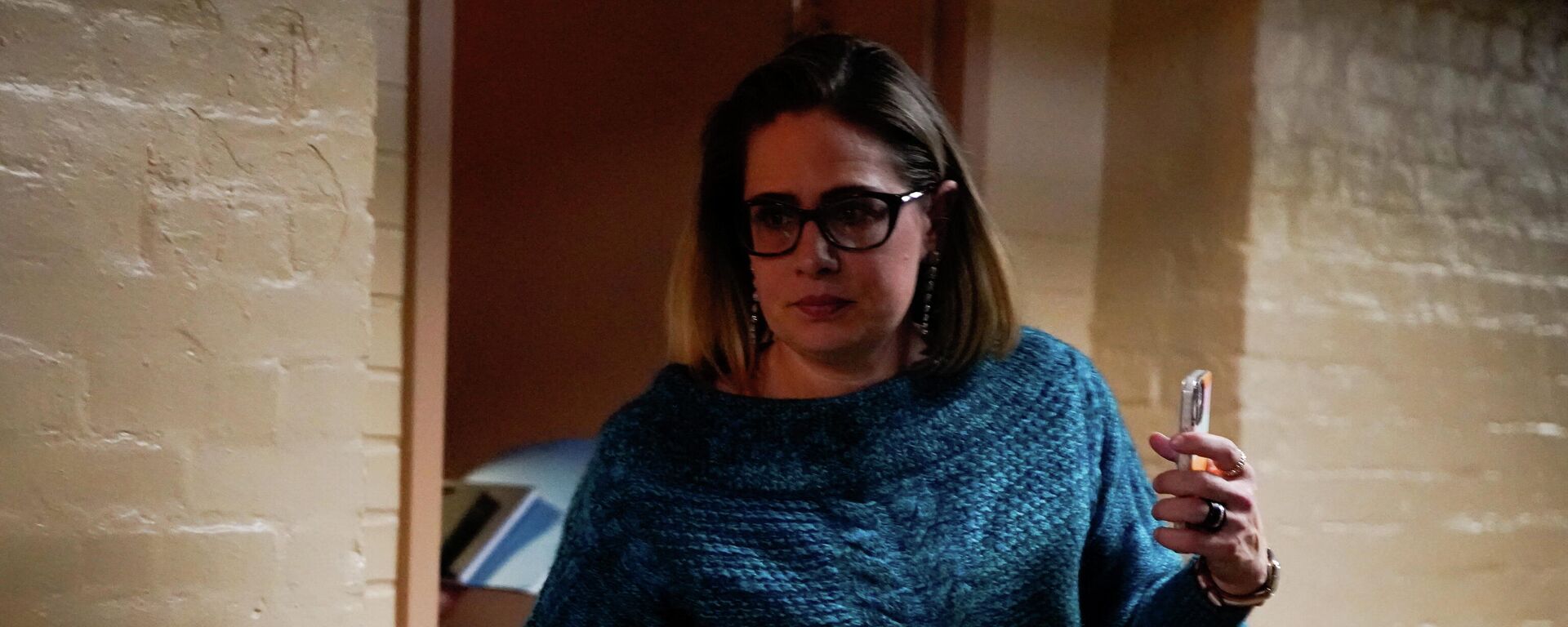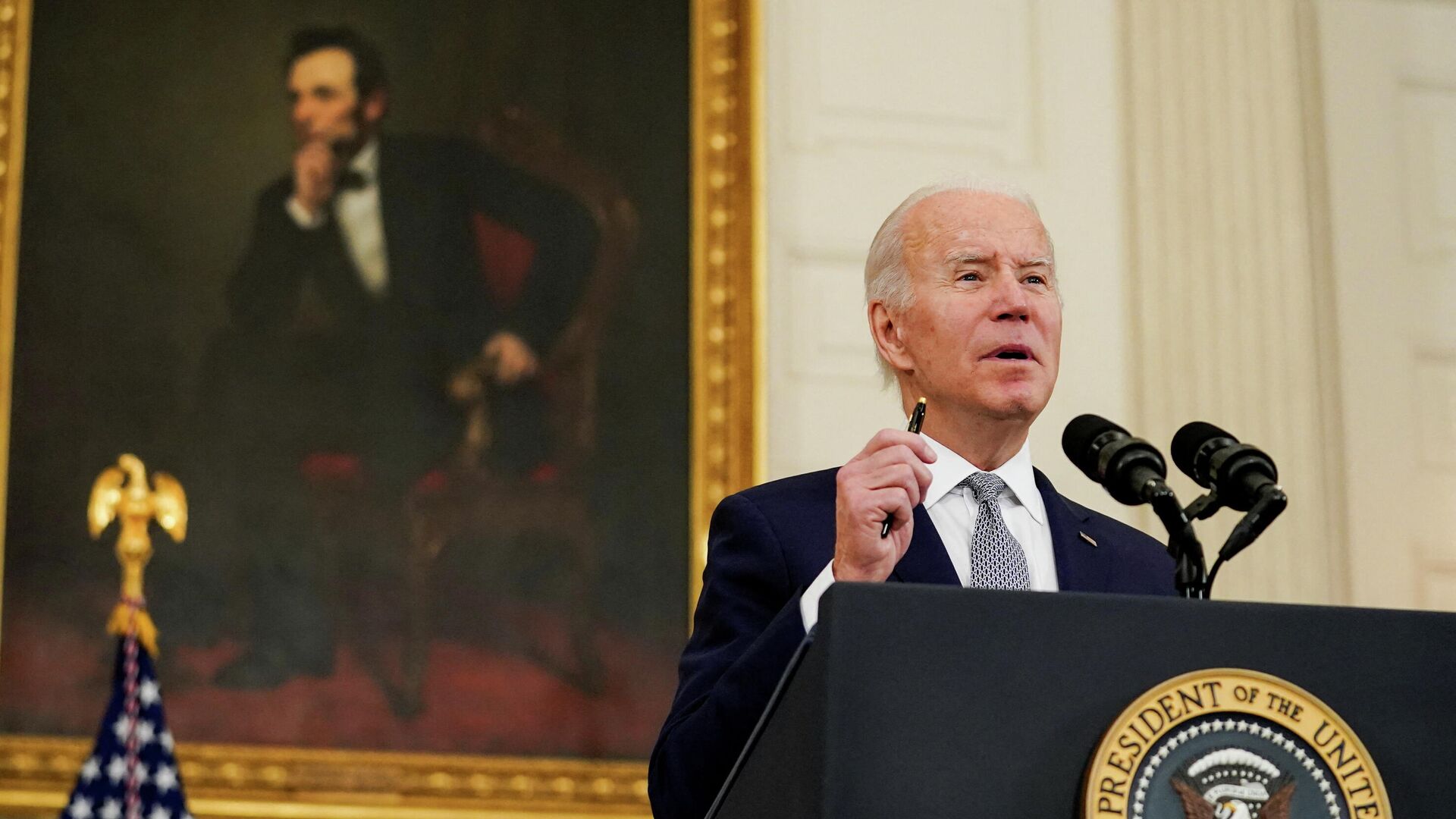https://sputnikglobe.com/20220117/biden-uses-mlk-jr-day-to-push-democrats-voting-rights-bills-1092326661.html
Biden Uses MLK Jr. Day to Push Democrats' Voting Rights Bills
Biden Uses MLK Jr. Day to Push Democrats' Voting Rights Bills
Sputnik International
Americans commemorate Martin Luther King Jr. Day on Monday, with the federal holiday introduced in the 1980s to celebrate the life of the civil rights leader... 17.01.2022, Sputnik International
2022-01-17T19:02+0000
2022-01-17T19:02+0000
2022-01-17T19:40+0000
joe biden
voting rights
https://cdn1.img.sputnikglobe.com/img/07e6/01/07/1092101399_0:0:2958:1665_1920x0_80_0_0_0b6826e26f89afac7d75ef83d429ce86.jpg
President Joe Biden used his official MLK Jr. Day commemoration speech Monday to make a renewed public push in favour of a pair of voting rights bills Democrats say will expand democracy in America, but which Republicans fear will be an affront to state rights.“Last week, Vice President Harris and I visited Atlanta, Georgia, the cradle of civil rights in America. We paused and prayed at the crypt of Dr. and Mrs. King. We met members of their family…We met students who are changing the world just like generations of young people before them had done that. In fact Dr. King was just one those young people – [a] 15-year-old student at Morehouse College when he began his journey to fulfill the promise of an America for all Americans, a promise that holds that we’re all created equal, and deserve to be treated equally throughout our lives,” Biden said in his pre-taped address.“Dr. King wasn’t just a dreamer of that promise, he was a doer. And on this federal holiday that honours him, it’s not just enough to praise him, we must commit to his unfinished work to deliver jobs and justice, to protect the sacred right to vote, the right from which all other rights flow,” the president added.Suggesting that America is suffering attacks against its democracy, “from the January 6 insurrection to the onslaught of Republicans’ anti-voting laws in a number of state,” Biden said that “it’s no longer just about who gets to vote, it’s about who gets to count the vote, and whether your vote counts at all.”“I know where I stand. And it’s time for every elected official in America to make it clear where they stand. It’s time for every American to stand up, speak out, be heard. Where do you stand? Whose side are you on? On this day of remembrance, service and action, may God bless Dr. And Mrs. King and their family. And may God bless you all. And may God protect our troops,” Biden concluded.Twin BillsDemocratic lawmakers seek to pass two major voting rights bills – the ‘Freedom to Vote Act’ and the ‘John Lewis Voting Rights Advancement Act’. The president’s party says the bills, if approved into law, will broaden election access, reduce discrimination against minorities and protect election officials from partisan influence.Republicans have expressed serious reservations about the bills, dismissing their central claim about advancing voting rights, and suggesting that their goals include creating federal encroachments on state rights and an effort to ensure that Democrats are able to win as many future elections as possible through a voting system that is less secure.The bills passed the Democrat-controlled house of Representatives last week, and enjoy a slim partial majority of support in the Senate, where Never Trumper GOP Senator Lisa Murkowski of Alaska supports the John Lewis bill, but not the Freedom to Vote bill. Democrats require 60 votes to get the bills passed, but most Republicans have sought to stonewall the legislation. The president’s party also lacks the 50 votes needed to change the threshold to drop the 60 vote rule in favour of a simple majority, with conservative Democratic senators Kyrsten Sinema and Joe Manchin pushing for the traditional 60 votes on the voting rights matter.The twin bills will be up for debate beginning Tuesday, with a vote possible as soon as Wednesday, according to officials.From Pariah of the State to HeroMartin Luther King Jr. is now a celebrated civil rights leader in the United States. However, during his lifetime, he was subjected to constant surveillance under the FBI's domestic counterintelligence programme (COININTELPRO), with the domestic intelligence agency searching for evidence of subversive and communist influence and digging up dirt on his personal life.King was assassinated on 4 April, 1968 in Memphis, Tennessee by James Earl Ray. The mysterious circumstances of the civil rights leader's killing quickly gave birth to alternative theories on his death, particularly after Ray recanted his confession and claimed he was coerced into giving it. In 1999, a jury in a Memphis civil suit concluded that King was assassinated as a result of a conspiracy involving the US government. King's wife and other members of his family believe Ray was set up to take the fall. A federal investigation by Attorney General Janet Reno concluded in the year 2000 however that there was 'no evidence' of a conspiracy.MLK Jr. was just one of a series of US officials to have been killed under suspicious circumstances in the 1960s, starting with the November 1963 assassination of John F. Kennedy and ending with the June 1968 killing of his brother, former attorney general Robert F. Kennedy. Malcolm X, another African American civil rights leader from its more militant flank, was murdered in February 1965, with allegations made about FBI involvement in that killing.
https://sputnikglobe.com/20220112/partisan-fight-intensifies-as-voting-rights-bill-in-hot-water-in-us-senate-yetagain-1092209922.html
https://sputnikglobe.com/20220113/democrats-voting-rights-bill-in-critical-danger-as-sen-sinema-doubles-down-on-filibuster-support--1092243185.html
Sputnik International
feedback@sputniknews.com
+74956456601
MIA „Rossiya Segodnya“
2022
News
en_EN
Sputnik International
feedback@sputniknews.com
+74956456601
MIA „Rossiya Segodnya“
Sputnik International
feedback@sputniknews.com
+74956456601
MIA „Rossiya Segodnya“
joe biden, voting rights
Biden Uses MLK Jr. Day to Push Democrats' Voting Rights Bills
19:02 GMT 17.01.2022 (Updated: 19:40 GMT 17.01.2022) Americans commemorate Martin Luther King Jr. Day on Monday, with the federal holiday introduced in the 1980s to celebrate the life of the civil rights leader –whose protest against racial discrimination in US federal and state laws helped improve black people’s lot in America, mostly after his assassination in 1968.
President Joe Biden used his official MLK Jr. Day commemoration speech Monday to make a renewed public push in favour of a pair of voting rights bills Democrats say will expand democracy in America, but which Republicans fear will be an affront to state rights.
“Last week, Vice President Harris and I visited Atlanta, Georgia, the cradle of civil rights in America. We paused and prayed at the crypt of Dr. and Mrs. King. We met members of their family…We met students who are changing the world just like generations of young people before them had done that. In fact Dr. King was just one those young people – [a] 15-year-old student at Morehouse College when he began his journey to fulfill the promise of an America for all Americans, a promise that holds that we’re all created equal, and deserve to be treated equally throughout our lives,” Biden said in his pre-taped address.
“Dr. King wasn’t just a dreamer of that promise, he was a doer. And on this federal holiday that honours him, it’s not just enough to praise him, we must commit to his unfinished work to deliver jobs and justice, to protect the sacred right to vote, the right from which all other rights flow,” the president added.
Suggesting that America is suffering attacks against its democracy, “from the January 6 insurrection to the onslaught of Republicans’ anti-voting laws in a number of state,” Biden said that “it’s no longer just about who gets to vote, it’s about who gets to count the vote, and whether your vote counts at all.”
Saying that Dr. King had “held a mirror up to America” and asked Americans to reflect on who they were as a nation, Biden argued that the country faces a similar moment today. “The question being asked again: where do we stand? Whose side are we on? Will we stand against voter suppression? Yes or no? Will we stand against election subversion? Yes or no?” he asked.
“I know where I stand. And it’s time for every elected official in America to make it clear where they stand. It’s time for every American to stand up, speak out, be heard. Where do you stand? Whose side are you on? On this day of remembrance, service and action, may God bless Dr. And Mrs. King and their family. And may God bless you all. And may God protect our troops,” Biden concluded.
Democratic lawmakers seek to pass two major voting rights bills – the ‘Freedom to Vote Act’ and the ‘John Lewis Voting Rights Advancement Act’. The president’s party says the bills, if approved into law, will broaden election access, reduce discrimination against minorities and protect election officials from partisan influence.

12 January 2022, 16:44 GMT
Republicans have
expressed serious reservations about the bills, dismissing their central claim about advancing voting rights, and suggesting that their goals include creating federal encroachments on state rights and an effort to ensure that Democrats are able to win as many future elections as possible through a voting system that is less secure.
The bills passed the Democrat-controlled house of Representatives last week, and enjoy a slim partial majority of support in the Senate, where Never Trumper GOP Senator Lisa Murkowski of Alaska supports the John Lewis bill, but not the Freedom to Vote bill. Democrats require 60 votes to get the bills passed, but most Republicans have sought to stonewall the legislation. The president’s party also lacks the 50 votes needed to change the threshold to drop the 60 vote rule in favour of a simple majority, with conservative Democratic senators Kyrsten Sinema and Joe Manchin pushing for the traditional 60 votes on the voting rights matter.
The twin bills will be up for debate beginning Tuesday, with a vote possible as soon as Wednesday, according to officials.

13 January 2022, 23:10 GMT
From Pariah of the State to Hero
Martin Luther King Jr. is now a celebrated civil rights leader in the United States. However, during his lifetime, he was subjected to constant surveillance under the FBI's domestic counterintelligence programme (COININTELPRO), with the domestic intelligence agency searching for evidence of subversive and communist influence and digging up dirt on his personal life.
King was assassinated on 4 April, 1968 in Memphis, Tennessee by James Earl Ray. The mysterious circumstances of the civil rights leader's killing quickly gave birth to alternative theories on his death, particularly after Ray recanted his confession and claimed he was coerced into giving it. In 1999, a jury in a Memphis civil suit concluded that King was assassinated as a result of a conspiracy involving the US government. King's wife and other members of his family believe Ray was set up to take the fall. A federal investigation by Attorney General Janet Reno concluded in the year 2000 however that there was 'no evidence' of a conspiracy.
MLK Jr. was just one of a series of US officials to have been killed under suspicious circumstances in the 1960s, starting with the November 1963 assassination of John F. Kennedy and ending with the June 1968 killing of his brother, former attorney general Robert F. Kennedy. Malcolm X, another African American civil rights leader from its more militant flank, was murdered in February 1965, with allegations made about FBI involvement in that killing.



